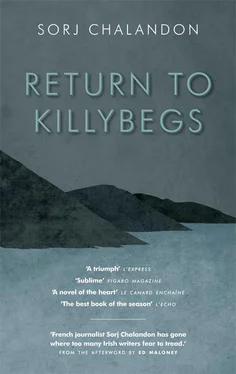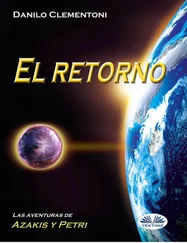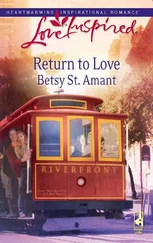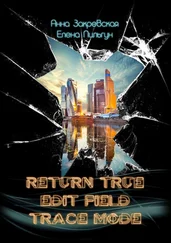Sorj Chalandon
Return to Killybegs
Now that everything is out in the open, they will all speak in my place — the IRA, the British, my family, my close friends, journalists I’ve never even met. Some of them will go so far as to explain how and why I ended up a traitor. It incenses me that books may well be written about me. Do not listen to any of their claims. Do not trust my enemies, and even less my friends. Ignore those who will say they knew me. Nobody has ever walked in my shoes, nobody. The only reason I am speaking out now is because I am the only one who can tell the truth. After I’m gone, I hope for silence.
Killybegs, 24 December 2006
Tyrone Meehan
When my father beat me he’d shout in English, as if he didn’t want his language mixed up in that. He’d strike with his mouth twisted, yelling like a soldier in combat. When my father beat me he was no longer my father, just Padraig Meehan. War-wounded, stony-faced, Meehan the ill wind people crossed the street to avoid. When my father had been drinking he’d batter the ground; shatter the air. When he’d come into my room, the night would shift. He wouldn’t light the candle. He’d breathe like an old animal and I’d wait for the blows.
When my father had been drinking he’d occupy Ireland the way our enemy had. His hostility was widespread. It extended from under our roof, across his threshold, along the lanes of Killybegs, over the bog and the edge of the forest, covering day and night. Far and wide, he’d take over areas with sudden advances. You’d see him from a long way off. You’d hear him from a long way off. He’d trip over his words and movements. In Mullin’s, the village pub, he’d slide from his barstool, approach tables and slam his hands down flat between the glasses. That was his response when he didn’t agree with someone. No words, his fingers in the spilt beer and that look of his. The others would fall silent, caps lowered and eyes hidden. Then he’d stand up straight again, challenging the room with arms crossed, waiting for a response. When my father had been drinking he’d frighten people.
One day, on the lane down to the port, he punched George, old McGarrigle’s mule. The coalman had named his animal after the king of England so he’d be able to boot him up the backside. I was there, following my father. Still intoxicated from the previous night, he walked with jerky, staggering steps and I scurried along in his wake. On a street corner, opposite the church, old McGarrigle was struggling. He pulled at his motionless donkey, one hand on the saddle, the other on the halter, and threatened him, calling him every name under the sun. My father stopped. He watched the old man with his baulking animal, the distress of one, the obstinacy of the other, and he crossed the street. He pushed McGarrigle aside and stood facing the donkey, talking to him roughly, as though speaking with the British sovereign. He asked him whether he knew who Padraig Meehan was, if he’d any idea who he was dealing with. He was bent over him, forehead to forehead, menacing, waiting for a response from the animal, a movement, surrender. And then he struck, a terrible blow between the eye and nostril. George swayed and keeled over on his flank. The cart tipped out its pieces of coal.
— Éirinn go Brách! shouted my father. Then he pulled me by the arm. Speaking Irish is resisting, he murmured once more. And we continued on our way.

As a child, my mother used to send me to fetch him home from the pub. It would be dark out. I’d be too afraid to go in so I’d wander back and forth in front of the pub’s frosted door and its windows with their curtains drawn. I’d wait for a man to emerge so I could slip in to the odour of sour beer, sweat, damp overcoats and cold tobacco.
— Looks like you’d best go home for your tea, Pat, my father’s friends would joke.
He’d raise his hand to me behind closed doors, but when I entered his world he’d welcome me with open arms. I was seven. I’d lower my head and stay standing against the bar while he finished his song. His eyes would be closed, one hand on his heart; he’d mourn his divided country, his dead heroes, his lost war; he’d beseech the Great Legends, the 1916 rebels, the funereal cohort of our defeated and all those who came before, the chiefs of the great Gaelic clans and Saint Patrick to boot, with his curved staff for driving out the English snake. And I’d watch him from below. I’d listen to him. Observing the other men’s silence, I was proud of him in spite of everything. Proud of Pat Meehan, proud of that father, despite the marks from his brown belt across my back and my hair torn out by the fistful; when he’d sing about our land, heads were held high and eyes filled with tears. Before becoming mean, my father was an Irish poet and I was welcomed as that man’s son. As soon as I came through the door I felt the warmth, too. Hands on my back, a squeeze of the shoulder, a man-to-man wink though I was only a child. Someone would let me sip the ochre froth of a Guinness. That’s where my bitterness began, and I had a taste for it. I drank that mixture of earth and blood, the thick blackness that would become my eau de vie.
— We drink our earth. We are no longer men. We are trees, my father would sing when he was happy.
The others would leave the pub, putting their glasses down and their caps on their heads. Not him, though. Before passing through the door, he’d always tell a story. He’d capture their attention one last time. He’d get up, slip his coat on.
Then, we’d go home, he and I. Him staggering, me telling myself I was supporting him. He’d point out the moon, its light on the path.
— It’s the light of the dead, he’d say.
Under its pale beams we already looked like ghosts. One foggy night, he took me by the shoulder. Before the swirling mists he promised me that after life everything would be like this, calm and beautiful. He swore to me that I’d no longer have to fear a thing. Passing in front of the crossed-out sign, ‘NA CEALLA BEAGA’, which marked the edge of our village, he assured me that they spoke Irish in paradise. And that the rain there was soft like this evening, but warm and tasting of honey. He laughed and pulled up the collar of my jacket to protect me from the cold. Once on the way home he even took my hand. I felt ill, knowing that this hand would become a fist again, would soon change from tenderness to metal. In an hour’s time or tomorrow and without my knowing why. Out of malice, pride, fury, out of habit. I was a prisoner of my father’s hand. But that night, with my fingers curled into his, I made the most of his warmth.

My father belonged to the Irish Republican Army. He was a volunteer, óglach in Irish, a simple soldier of the Donegal Brigade of the IRA. In 1921, he and several comrades opposed the ceasefire negotiated with the British. He refused to accept the border, the creation of Northern Ireland, the tearing in half of our homeland. He wanted to drive the British from the whole country, fight to the last bullet. After the War of Independence against the British, we had the Civil War amongst ourselves.
— The traitors, the cowards, the sell-outs! my father would hiss when he’d talk about his former brothers in arms who had supported the truce.
These felons were armed by the British and dressed by the British. They opened fire on their comrades. The only thing Irish about them was our blood on their hands.
Читать дальше













